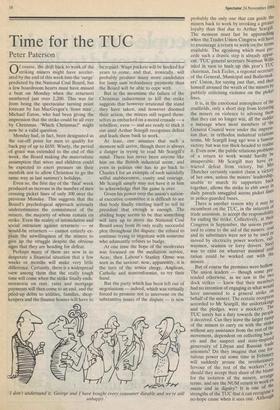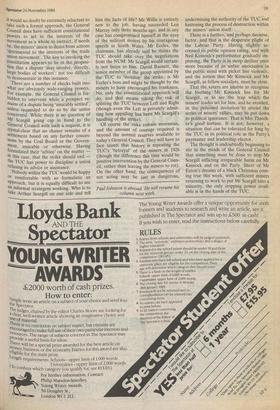Time for the TUC
Peter Paterson
Of course, the drift back to work of the striking miners might have acceler- ated by the end of this week into the 'surge' predicted by the National Coal Board, but a few boardroom hearts must have missed a beat on Monday when the returners numbered just over 2,200. This was far from being the spectacular turning point forecast by Ian MacGregor's 'front man', Michael Eaton, who had been giving the impression that the strike could be all over by Christmas. 'Which Christmas?' might now be a valid question.
Monday had, in fact, been designated as the cut-off point for men to qualify for back pay of up to £650. Wisely, the period of grace was extended to the end of this week, the Board making the materialistic assumption that wives and children could be expected to exert pressure on their menfolk not to allow Christmas to go the same way as last summer's holidays.
Even so, the first day of the 'final' week produced an increase in the number of men crossing picket lines of only 300 over the previous Monday. This suggests that the Board's psychological approach seriously underestimates the commitment of the miners, the majority of whom remain on strike. Even the reality of intimidation and social ostracism against returners — or would-be returners — cannot entirely ex- plain the unwillingness of the miners to give up the struggle despite the obvious signs that they are heading for defeat.
Perhaps many of them are now in so desperate a financial situation that a few weeks or months will make very little difference. Certainly, there is a widespread view among them that the really tough time will come when the strike finally ends: moratoria on rent, rates and mortgage payments will then come to an end, and the piled-up debts to utilities, families, shop- keepers and the finance houses will have to be repaid. Wage packets will be hocked for years to come, and that, ironically, will probably produce many more candidates for lump sum redundancy payments than the Board will be able to cope with.
But in the meantime the failure of the Christmas inducement to kill the strike suggests that however irrational the stand they have taken, and however doomed their action, the miners still regard them- selves as embarked on a moral crusade — a rebellion, even — and are ready to stick it out until Arthur Scargill recognises defeat and leads them back to work.
At least, one assumes that such a moment will arrive, though there is always a danger in trying to read Mr Scargill's mind. There has never been anyone like him on the British industrial scene, and even in politics one has to go back to Charles I for an example of such suicidally wilful stubbornness, vanity and courage. Mr Scargill simply may not have it in him to acknowledge that the game is over.
Given his power over the union's nation- al executive committee it is difficult to see that body finally exerting itself to tell its president that enough is enough. The abiding hope seems to be that something will turn up to move the National Coal Board away from its only really successful ploy throughout the dispute: the refusal to continue trying to negotiate with someone who adamantly refuses to budge.
At one time the hope of the moderates was focussed on the mediation service, Acas; then Labour's Stanley Orme was seen as the saviour; now, apparently, it is the turn of the senior clergy, Anglican, Catholic and nonconformist, to try their hand.
But the party which has been left out of negotiations — indeed, which was virtually forced to promise not to intervene on the substantive issues of the dispute — is now
'I don't understand it, George and I have bought every consumer durable and we're still
unhappy.'
probably the only one that can guide the miners back to work by invoking a greater loyalty than that due to Arthur Scargill. The moment must fast be approaching when the Trades Union Congress will have to encourage a return to work on the terms available. The agonising which must pre- cede such a drastic step is already appar- ent. TUC general secretary Norman Willis tried in vain to hush up this year's TUt- chairman, Jack Eccles, a regional secretary of the General, Municipal and Boilermak- ers' Union, for saying just that, and then himself aroused the wrath of the miners bY publicly criticising violence on the picket lines.
It is, in the emotional atmosphere of the coalfields, only a short step from lecturing the miners on violence to advising the!" that they can no longer win, all the sadder a message when most members of the General Council were under the impress- ion that, in orthodox industrial relations terms, Mr Scargill long ago won a famous victory but was too thick-headed to realise it. Even now, the public relations problems of a return to work would hardly be insuperable: Mr Scargill may have ex- tracted defeat from victory, but Mrs Thatcher certainly cannot claim a victorY of her own, unless the miners' leadershiP, unable to march its supporters haek together, allows the strike to ebb away 111 daily parcels smuggled across picket lines in police-guarded buses. There is another reason why it may be, incumbent on the TUC, in the interests r" trade unionism, to accept the responsibilitY for ending the strike. Collectively, at then. Congress in September, the unions pronl- ised to come to the aid of the miners: en"' and its substitutes were not to be used or moved by electricity power workers, rail; waymen, seamen or lorry drivers. Stee! was to exist on whatever minimal coal ration could be worked out with the miners.
But of course the promises were holloW. The union leaders — though some pre- tended otherwise, as we saw in the two dock strikes — knew that their menthefAs had-no intention of engaging in what woulo have amounted to a general strike 0" behalf of the miners. The ecstatic reception accorded to Mr Scargill, the undertakings and the pledges, were a mockery. 11;e 'e TUC surely has a duty towards the peoP it deceived. Can they leave the larger alibi) of the miners to carry on with the strike without any assistance from the rest of the movement, dependent on collecting buck] ets and the suspect and state-inspiro generosity of Libyan and Russian trade unionists? Do they imagine that one for" tuitous power cut some time in Februal will suddenly arouse the revolutionarY fervour of the rest of the workers? °I. should they accept their share of the blame for the isolation of the miners, arrange terms, and see the NUM return to work ett masse and in dignity? It is one of the strengths of the TUC that it can recognise! no-hope cause when it sees one. Althoup it would no doubt be extremely reluctant to take such a formal approach, the General Council does have sufficient constitutional Powers to act in the interests of the movement as a whole to instruct, if needs be, the miners' union to desist from actions 'detrimental to the interests of the trade union movement'. The key to invoking the cOnstitution appears to lie in the proposi- tion that a dispute 'may involve, directly, large bodies of workers': not too difficult to demonstrate in this instance.
There are a number of checks built into What are obviously wide-ranging powers. For example, the General Council is for- bidden to intervene while a prospect re- mains of a dispute being 'amicably settled', unless requested to do so by the union concerned. While there is no question of Mr Scargill going cap in hand to the General Council with such a request, it is crystal-clear that no chance remains of a settlement based on any further conces- sions by the Coal Board or the Govern- ment, amicable or otherwise. Having formulated their 'advice' on the matter
in this case, that the strike should end — the TUC has power to discipline a union refusing its advice or assistance.
Nobody within the TUC would be happy or comfortable with so formalistic an aPProach, but it is equally difficult to see an informal strategem working. Who is to take Arthur Scargill on one side and tell him the facts of life? Mr Willis is entirely new to the job, having succeeded Len Murray only three months ago, and in any case has compromised himself in the eyes of the militant miners by his courageous speech in South Wales. Mr Eccles, the chairman, has already said he thinks the TUC should take over the negotiations from the NUM: Mr Scargill would certain- ly not listen to him. David Basnett, the senior member of the group appointed by the TUC to 'monitor' the strike, is Mr Eccles's boss and might be thought by the miners to have encouraged his frankness. No, only the constitutional approach will do, and that means taking the risk of splitting the TUC between Left and Right (though even the Left is privately admit- ting how appalling has been Mr Scargill's handling of the strike). Of course the risks remain enormous, and the amount of courage required is beyond the normal reserves available to today's General Council. They will have to face taunts that history is repeating the TUC's 'betrayal' of the miners in 1926 (though the difference this time would be positive intervention by the General Coun- cil, rather than leaving the miners to rot). On the other hand, the consequences of not acting may be just as dangerous, undermining the authority of the TUC and hastening the process of destruction within the miners' union itself.
There is a further, and perhaps decisive, factor, and that is the desperate plight of the Labour Party. Having slightly in- creased its public opinion rating, and with Neil Kinnock's performance gradually im- proving, the Party is in steep decline once more because of an unfair association in the public mind with picket line violence, and the notion that Mr Kinnock and Mr Scargill, as fellow socialists, must be close.
That the voters are unable to recognise the loathing Mr Kinnock has for Mr Scargill, or to see the trap which the miners' leader set for him, and he avoided, in the poisoned invitation to attend the series of miners' rallies, may be put down to political ignorance. That is Mrs Thatch- er's good fortune. It is not, however, a situation that can be tolerated for long by the TUC in its political role as the Party's paymaster and leadership elector.
The thought is undoubtedly beginning to stir in the minds of the General Council that something must be done to stop Mr Scargill inflicting irreparable harm on Mr Kinnock and on the Party. Short of Mr Eaton's dreams of a black Christmas com- ing true this week, with sufficient miners returning to work to put Mr Scargill into a minority, the only stopping power avail- able is in the hands of the TUC.























































 Previous page
Previous page